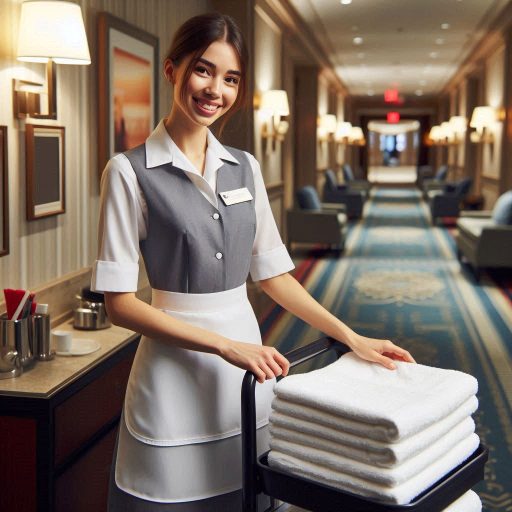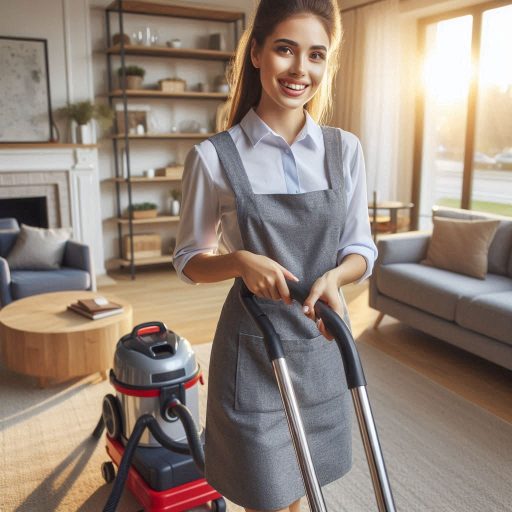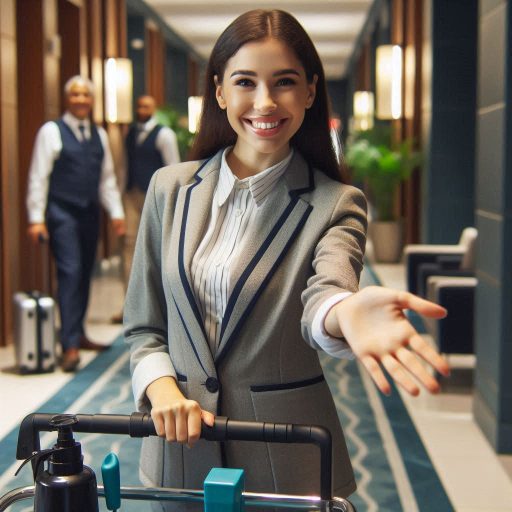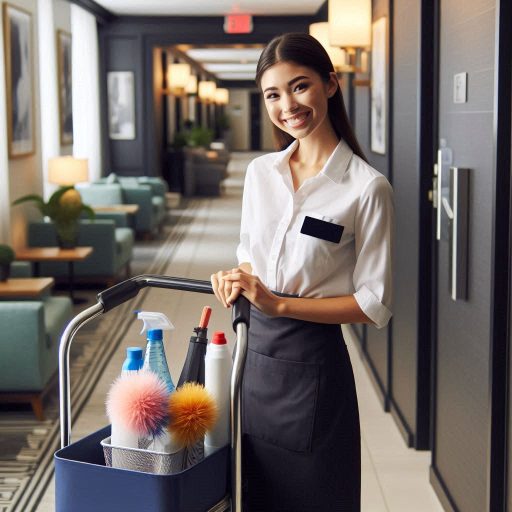Introduction
Understanding the hierarchy within the housekeeping department is crucial for efficient hotel operations.
Each role has specific responsibilities that contribute to maintaining high cleanliness standards.
A clear hierarchy ensures tasks are delegated effectively and workflows remain smooth.
At the top, the executive housekeeper oversees the entire department.
They manage cleaning procedures, staff schedules, and overall operations.
The assistant executive housekeeper supports daily functions, including staff training and addressing guest requests.
This role is vital for maintaining operational efficiency.
Housekeeping supervisors lead teams of room attendants.
They ensure that each room is cleaned to the hotel‘s high standards.
Room attendants are responsible for cleaning and maintaining guest rooms.
They follow strict cleaning protocols to ensure guest satisfaction.
Additionally, the laundry supervisor manages laundry operations.
They ensure linens and towels are cleaned and available for use.
Public area cleaners focus on maintaining common spaces like lobbies and hallways.
They ensure these areas are always clean and inviting for guests.
Each position within the housekeeping department plays a vital role.
Effective communication and teamwork among staff members lead to high guest satisfaction.
Understanding these roles helps create a well-functioning department that enhances the overall guest experience.
Executive Housekeeper
Highest-Ranking Position in the Housekeeping Department
The executive housekeeper holds the highest-ranking position in the housekeeping department.
This role involves overseeing the entire operation.
The executive housekeeper ensures all tasks are completed efficiently and to the hotel‘s high standards.
They act as the department leader, managing both staff and resources to achieve smooth daily operations.
Their leadership is crucial to ensuring the housekeeping team functions effectively.
Responsible for Overall Management and Supervision of the Department
The executive housekeeper is responsible for the overall management and supervision of the housekeeping department.
They lead the team, making sure all members know their duties.
They handle hiring, training, and evaluating staff performance to maintain efficiency.
This role involves ensuring that each employee performs their tasks correctly and within the hotel‘s cleanliness standards.
By actively managing the team, the executive housekeeper helps improve staff morale and productivity.
This position also requires strong communication skills.
The executive housekeeper must work closely with other hotel departments, such as front desk and maintenance.
They ensure housekeeping services are aligned with guest needs and overall hotel operations.
Coordination with other teams helps prevent any delays or issues that could impact guest experiences.
Develops Cleaning Schedules and Procedures
The executive housekeeper develops cleaning schedules that align with the hotel‘s needs and guest activities.
They create daily, weekly, and seasonal cleaning plans that maintain the property‘s appearance.
Proper scheduling ensures that cleaning activities happen without disturbing guests or hotel operations.
This includes cleaning guest rooms, public areas, and back-of-house spaces like laundry and storage.
In addition to scheduling, the executive housekeeper develops cleaning procedures.
They establish protocols for the team to follow, ensuring consistency and quality.
By setting clear standards, the executive housekeeper helps maintain a clean and welcoming environment.
They often research new cleaning technologies and methods to enhance the team‘s efficiency and the quality of their work.
Ensures High Standards of Cleanliness and Guest Satisfaction
Ensuring high standards of cleanliness is one of the executive housekeeper‘s most important tasks.
They regularly inspect guest rooms, public areas, and other spaces to ensure they meet the hotel‘s expectations.
By monitoring the cleanliness levels, the executive housekeeper ensures guests have a positive experience.
Cleanliness is key to guest satisfaction, and the executive housekeeper plays a major role in maintaining this.
When cleanliness issues arise, the executive housekeeper addresses them promptly.
They work directly with the team to resolve complaints or special requests from guests.
Their swift actions help improve guest experiences and build a strong reputation for the hotel.
Guest satisfaction remains the ultimate goal, and the executive housekeeper ensures the housekeeping team delivers on this promise every day.
Read: Finding the Right Work-Life Balance as a Nail Tech
Assistant Executive Housekeeper
Supporting Daily Housekeeping Operations
The assistant executive housekeeper plays a key role in supporting the executive housekeeper in managing daily operations.
They act as the second-in-command, stepping in when needed to ensure smooth functioning.
The assistant executive housekeeper‘s duties include overseeing staff training, handling guest complaints, and managing inventory.
Oversees Staff Training and Scheduling
One of the assistant executive housekeeper‘s primary responsibilities is overseeing staff training.
They ensure new employees understand cleaning procedures, safety protocols, and hotel standards.
They provide ongoing training to help staff improve their skills and stay updated on industry practices.
By offering consistent guidance, the assistant executive housekeeper ensures the team maintains high efficiency.
In addition to training, the assistant executive housekeeper manages scheduling.
They create shift plans that match the hotel‘s occupancy levels and daily needs.
This involves coordinating staff availability, balancing workloads, and ensuring enough employees are on duty during peak times.
Proper scheduling helps the housekeeping department run smoothly, preventing delays and ensuring all tasks are completed on time.
Handles Guest Complaints and Requests
The assistant executive housekeeper also plays a vital role in guest service.
They handle guest complaints related to cleanliness or housekeeping services.
If a guest reports an issue, the assistant executive housekeeper takes immediate action to resolve it.
Whether it‘s a room that requires extra attention or a special cleaning request, they work with the team to deliver quick solutions.
This proactive approach helps maintain guest satisfaction and ensures issues don‘t escalate.
Guest requests, such as extra linens or room adjustments, are also managed by the assistant executive housekeeper.
They ensure the housekeeping team promptly responds to these requests, enhancing the overall guest experience.
Their ability to handle guest interactions with professionalism is essential to maintaining the hotel‘s reputation.
Assists in Budgeting and Inventory Management
The assistant executive housekeeper assists the executive housekeeper with budgeting and inventory management.
They monitor the department‘s budget, keeping track of expenses related to cleaning supplies, equipment, and staff wages.
By helping to manage costs, they ensure the housekeeping department operates efficiently within the hotel‘s financial limits.
Inventory management is another critical task.
The assistant executive housekeeper tracks housekeeping supplies, ensuring enough stock is available without overordering.
They regularly check inventory levels, reorder items when needed, and avoid wastage.
Keeping an organized inventory system helps the department run smoothly and prevents shortages that could delay cleaning services.
Supporting the Executive Housekeeper
In all these tasks, the assistant executive housekeeper supports the executive housekeeper by sharing the workload and providing backup when necessary.
Their role is crucial to keeping the housekeeping department organized and efficient.
By managing staff training, guest requests, budgeting, and inventory, they help maintain high cleanliness standards and contribute to guest satisfaction.
The assistant executive housekeeper ensures that operations flow seamlessly and that the team delivers excellent service daily.
Read: Steps to Become a Professional Pet Groomer in the USA
Housekeeping Supervisors
Housekeeping supervisors play a crucial role in managing teams of room attendants and housekeeping staff.
They oversee daily operations to ensure rooms are cleaned efficiently and meet the hotel‘s high standards.
Housekeeping supervisors are responsible for maintaining the quality of work and guiding their teams to achieve cleanliness goals.
In Charge of a Team of Room Attendants and Housekeeping Staff
Housekeeping supervisors are responsible for leading teams of room attendants and other housekeeping staff.
They assign tasks, monitor performance, and ensure that each team member completes their duties on time.
By actively managing the team, supervisors make sure rooms and public areas are cleaned according to the hotel‘s schedule.
Effective leadership helps keep the team organized and focused, allowing them to work efficiently.
The supervisor‘s ability to manage staff directly impacts the success of the housekeeping department.
They ensure that everyone knows their responsibilities and works together to achieve common goals.
Good communication between supervisors and their teams helps prevent misunderstandings and delays.
Ensures Rooms are Cleaned Efficiently and to High Standards
A key responsibility of the housekeeping supervisor is ensuring that rooms are cleaned to the hotel‘s high standards.
Supervisors perform regular inspections of guest rooms and public areas to confirm that cleanliness meets expectations.
They quickly address any issues or missed spots, ensuring the hotel maintains a spotless environment.
Supervisors also focus on improving efficiency.
They work with their teams to optimize cleaning procedures, ensuring tasks are completed in a timely manner.
This balance between speed and quality is essential for meeting guest expectations and maintaining high service standards.
Reports to the Assistant Executive Housekeeper
Housekeeping supervisors report directly to the assistant executive housekeeper.
They communicate daily updates on the team‘s performance, room conditions, and any challenges that arise.
By keeping the assistant executive housekeeper informed, supervisors ensure that issues are addressed quickly and that the department runs smoothly.
The supervisor‘s role as a liaison helps bridge the gap between housekeeping staff and upper management.
They provide feedback to the assistant executive housekeeper on staffing needs, supply shortages, or any concerns within the team.
This communication ensures the department remains well-organized and responsive to the hotel‘s needs.
Provides On-the-Job Training and Performance Evaluations for Staff
Housekeeping supervisors are also responsible for training new team members.
They provide on-the-job training, ensuring that staff understand cleaning procedures, safety protocols, and hotel standards.
Through hands-on guidance, supervisors help new employees become efficient and confident in their roles.
In addition to training, supervisors evaluate staff performance.
They conduct regular performance reviews to ensure team members meet expectations.
If a staff member needs improvement, the supervisor provides constructive feedback and additional training.
By continuously monitoring and supporting their teams, supervisors help maintain high levels of cleanliness and efficiency.
Housekeeping supervisors are vital to the success of the housekeeping department.
They lead teams, ensure rooms are cleaned efficiently, report to the assistant executive housekeeper, and provide essential training and evaluations for staff.
Their leadership and attention to detail contribute to the overall quality of the guest experience.
Read: Essential Skills Every Pet Groomer Should Have
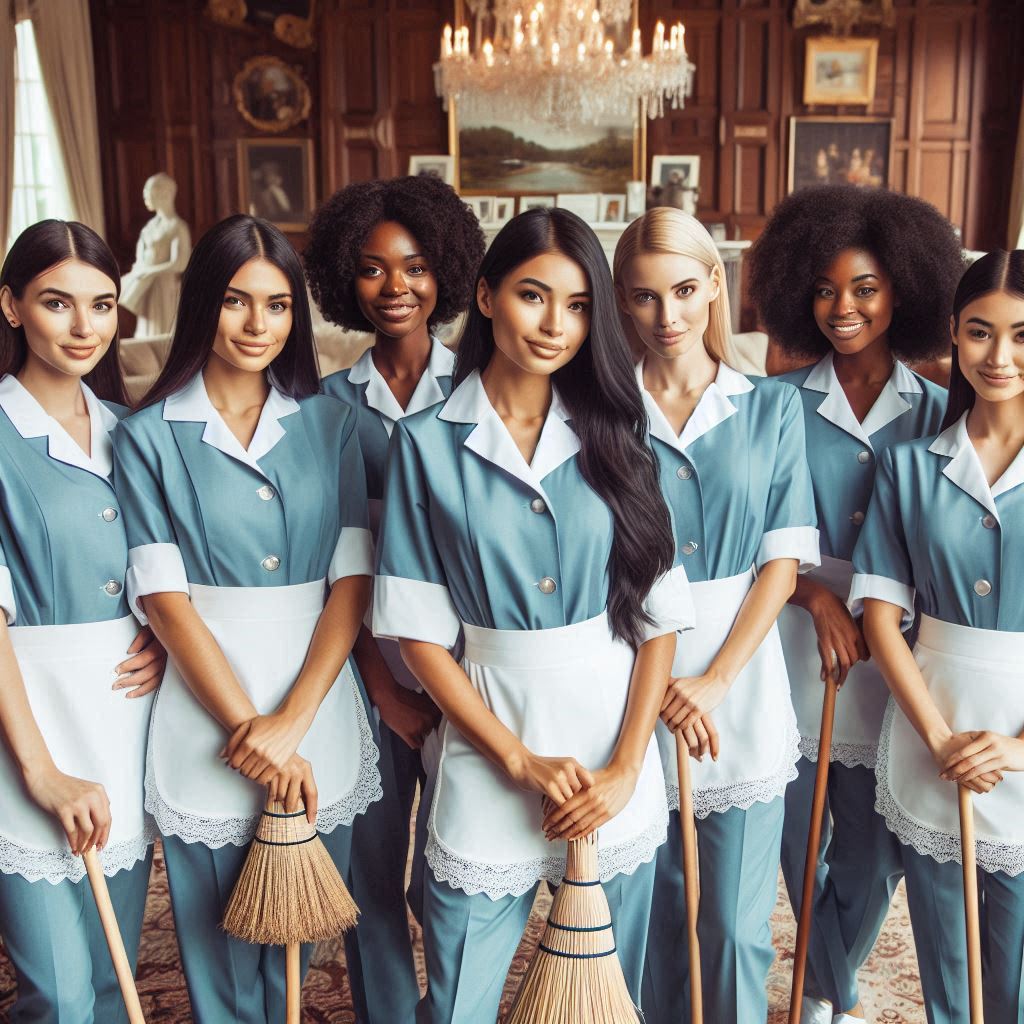
Room Attendants
Room attendants play a vital role in maintaining the cleanliness and comfort of guest rooms.
They ensure that rooms are properly cleaned and prepared to meet hotel standards.
These attendants contribute directly to the guest experience by providing a welcoming, clean environment during each stay.
Transform Your Career Today
Unlock a personalized career strategy that drives real results. Get tailored advice and a roadmap designed just for you.
Start NowResponsible for Cleaning and Maintaining Guest Rooms
Room attendants are responsible for cleaning and maintaining guest rooms to ensure they are spotless and ready for new arrivals.
They clean all areas of the room, including beds, bathrooms, and floors.
They replace linens, towels, and toiletries to ensure guests have everything they need for a comfortable stay.
Attendants also organize the room‘s layout, making sure it looks neat and inviting.
This cleaning process ensures that each guest receives the same high-quality service.
The room attendant‘s attention to detail is essential in maintaining the overall cleanliness of the hotel.
Their work directly impacts how guests feel when they walk into their rooms.
Follow Cleaning Procedures and Protocols Set by the Executive Housekeeper
Room attendants follow specific cleaning procedures and protocols developed by the executive housekeeper.
These protocols ensure consistency across all guest rooms.
Attendants are trained to use approved cleaning products and tools that meet the hotel‘s hygiene standards.
By adhering to these procedures, room attendants help prevent the spread of germs and maintain a sanitary environment.
The executive housekeeper‘s guidance ensures that all room attendants use the same cleaning methods, creating uniformity across the hotel.
This ensures guests can expect the same level of cleanliness in every room they visit.
Consistency is key to delivering high-quality service, and room attendants play a central role in maintaining it.
Report Any Maintenance Issues or Damages in the Rooms
In addition to cleaning, room attendants report any maintenance issues or damages they find during their work.
Whether it‘s a broken light, a leaky faucet, or a malfunctioning air conditioner, attendants notify the maintenance team immediately.
Quick reporting ensures that problems are addressed promptly, preventing any negative impact on the guest experience.
By identifying and reporting these issues, room attendants contribute to the overall upkeep of the hotel.
This proactive approach helps maintain the property in good condition and reduces the likelihood of guest complaints.
Provide Excellent Customer Service to Guests
Room attendants also provide excellent customer service to guests during their stay.
They greet guests politely when encountered and respond quickly to any room-related requests.
Whether guests need extra towels, pillows, or room cleaning at a specific time, attendants accommodate their needs efficiently.
Their interactions with guests can greatly influence the guest‘s overall experience.
A helpful, friendly room attendant can leave a lasting positive impression.
By focusing on both cleanliness and guest satisfaction, room attendants enhance the hotel‘s reputation and encourage repeat visits.
Room attendants are essential to maintaining the cleanliness and comfort of guest rooms.
They follow cleaning protocols, report maintenance issues, and provide excellent customer service.
Their role is crucial in ensuring a positive and memorable guest experience at the hotel.
Read: How to Handle Emergency Situations in Pet Grooming
Laundry Supervisor
The laundry supervisor manages the laundry operations within the housekeeping department.
They ensure that linens and towels are cleaned, folded, and ready for use.
Their role is critical in maintaining the smooth functioning of hotel services, directly affecting guest satisfaction and overall hotel operations.
Manages the Laundry Operations within the Department
The laundry supervisor is responsible for overseeing the entire laundry process within the housekeeping department.
They manage a team of laundry attendants, ensuring that tasks are completed efficiently.
Their role involves coordinating the collection of dirty linens, sorting them by type, and directing them to the appropriate cleaning machines.
By managing laundry operations effectively, the supervisor ensures that the hotel always has a steady supply of fresh linens and towels.
Their attention to detail helps prevent any delays in laundry services, which could disrupt guest experiences.
Effective management of the laundry process ensures smooth daily operations within the department.
Ensures All Linens and Towels Are Cleaned and Folded Properly
A key duty of the laundry supervisor is to ensure all linens and towels are cleaned and folded properly.
They inspect each item to confirm it meets the hotel‘s cleanliness standards.
After washing, the supervisor oversees the folding and organization of the laundry, making sure it‘s neatly presented and ready for use.
By focusing on cleanliness and proper presentation, the laundry supervisor ensures that guests receive fresh, high-quality linens during their stay.
Clean and well-folded linens enhance the overall guest experience, reflecting positively on the hotel‘s reputation.
Their attention to detail in laundry care contributes directly to maintaining high service standards.
Maintains Inventory of Clean Linens and Supplies
The laundry supervisor is responsible for maintaining an inventory of clean linens and laundry supplies.
They keep track of how many linens are available and ensure there is always enough stock to meet the hotel‘s demands.
The supervisor also monitors laundry supplies, such as detergents and fabric softeners, ensuring that these materials are ordered in time.
By keeping a well-organized inventory, the laundry supervisor ensures that the hotel never runs short on essential items.
They carefully balance stock levels, preventing shortages while avoiding overstocking, which can waste resources.
Their attention to inventory management helps the department run smoothly and efficiently.
Reports to the Executive Housekeeper or Assistant Executive Housekeeper
The laundry supervisor reports directly to the executive housekeeper or the assistant executive housekeeper.
They provide regular updates on laundry operations, inventory levels, and any issues that may arise.
If equipment malfunctions or there are supply shortages, the laundry supervisor communicates these problems immediately to ensure quick resolution.
By reporting to higher management, the laundry supervisor ensures that the department stays aligned with the hotel‘s overall goals.
This communication helps maintain efficiency and ensures any problems are addressed swiftly.
The supervisor‘s role as a liaison between laundry staff and management keeps the department organized.
The laundry supervisor plays an essential role in managing laundry operations, ensuring linens are cleaned properly, maintaining inventory, and reporting to management.
Their responsibilities directly contribute to the smooth functioning of the housekeeping department and the overall guest experience at the hotel.
Explore Further: Insurance Agent’s Guide to Regulatory Compliance
Public Area Cleaners
Public area cleaners play a key role in maintaining cleanliness in the hotel‘s shared spaces.
They are responsible for cleaning and ensuring the upkeep of all public areas, such as lobbies, entrances, and hallways.
Their efforts help create a welcoming environment that guests experience before even entering their rooms.
Responsible for Cleaning and Maintaining Public Areas of the Hotel
Public area cleaners focus on keeping all the hotel’s shared spaces spotless.
These areas include the hotel lobby, hallways, entrances, staircases, and public restrooms.
They follow strict cleaning schedules to ensure each area is cleaned thoroughly and regularly.
Clean public areas enhance the guest experience by presenting a professional and welcoming appearance.
A well-maintained lobby or entrance sets the tone for a guest‘s stay, reflecting the hotel‘s commitment to quality and cleanliness.
Sweep, Mop, Vacuum, and Dust All Common Areas
Public area cleaners perform a variety of cleaning tasks to maintain a spotless environment.
They sweep and mop floors, vacuum carpets, and dust furniture, fixtures, and d‘cor in all common areas.
Regular cleaning keeps the hotel looking fresh, and it helps prevent dust buildup, which can negatively impact the overall guest experience.
The cleaners also use special techniques to maintain the floors‘ appearance, ensuring that high-traffic areas remain pristine throughout the day.
Their meticulous work ensures that dirt and debris are quickly removed, keeping the public spaces clean and inviting at all times.
Keep Entrances, Hallways, and Lobby Areas Clean and Presentable
The first areas guests encounter in a hotel are the entrances, hallways, and lobby.
Public area cleaners ensure these spaces are always clean and presentable.
They regularly inspect and clean these high-traffic areas, removing any dirt, debris, or spills immediately.
A clean and well-organized lobby leaves a strong impression on guests, boosting their confidence in the hotel‘s overall cleanliness.
By focusing on these areas, public area cleaners play a direct role in maintaining the hotel‘s professional image and reputation.
Report Any Issues or Damages to Supervisors
In addition to cleaning, public area cleaners report any issues or damages they find while performing their duties.
Whether it‘s a broken light fixture, damaged furniture, or a leaky ceiling, they notify their supervisors immediately.
Quick reporting allows the hotel to address issues before they become major problems, preventing any negative impact on guest experiences.
Public area cleaners play an important role in keeping the hotel running smoothly.
Their vigilance helps ensure that the hotel remains well-maintained and that any issues are quickly resolved by the maintenance team.
Public area cleaners are essential to maintaining a hotel‘s shared spaces.
They sweep, mop, vacuum, dust, and ensure public areas remain clean and welcoming.
By reporting damages and addressing cleaning needs promptly, they help create a positive, lasting impression for all guests who walk through the hotel‘s doors.
Showcase Your Business Today
Reach thousands of readers actively exploring professional services. Publish your business profile and grow your audience now.
Publish NowConclusion
Each role within the housekeeping department plays a crucial part in maintaining the hotel‘s cleanliness and guest satisfaction.
The executive housekeeper leads the department, overseeing all cleaning procedures and ensuring high standards.
The assistant executive housekeeper supports daily operations, manages staff, and addresses guest requests.
Housekeeping supervisors guide room attendants and provide on-the-job training while ensuring room cleanliness.
Room attendants maintain guest rooms, follow cleaning protocols, and report maintenance issues.
The laundry supervisor manages laundry operations and inventory, while public area cleaners maintain the cleanliness of common spaces.
Communication and teamwork are essential for the department’s success.
Each team member relies on clear instructions, regular updates, and coordinated efforts to meet the hotel‘s cleanliness standards.
When team members communicate effectively, they can address issues quickly and provide seamless service to guests.
Teamwork helps create a unified approach, ensuring every role contributes to the overall guest experience.
A well-functioning housekeeping team enhances efficiency, reduces errors, and improves guest satisfaction.
Through collaboration, the housekeeping department plays a vital role in maintaining the hotel‘s reputation and delivering a memorable stay for every guest.
[E-Books for Sale]
The Big Book of 500 High-Paying Jobs in America: Unlock Your Earning Potential
$19.99 • 500 High-Paying Jobs • 330 pages
Explore 500 high-paying jobs in America and learn how to boost your career, earn more, and achieve success!
See All 500 High-Paying Jobs of this E-Book
1001 Professions Without a Degree: High-Paying American Jobs You Can Start Now
$19.99 • 1001 Professions Without a Degree • 174 pages
Discover 1001 high-paying jobs without a degree! Unlock career tips, skills, and success strategies for just $19.99!

